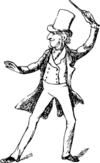Belbin's team roles
Abstract
To create the best team work, you need to know about how the different team workers behaves at their workspace and how to get the best out of the team members. The Belbin team roles can help you with identify the different team members strength and weaknesses. This can be used in all different kinds of projects and can help you create a team which have a high performance and efficiency. Belbin's team roles test looks at how people behave in team work and which roles suits the different team members best. The Belbin team roles test is done by a certified Belbin consultant.
This article will help you understand when you should use Belbin team roles, how to use them and discuss the limitations of using Belbin's team roles. This will be done by reading a lot of material such as Why use Belbin? [1]
Contents |
Dr. Meredith Belbin
Dr. Meredith Belbin has a doctor degree in psychology from Clare college in Cambridge. He has been an active management consultant in more than fifty years for many different international and private firms. He is a professor and researcher at Henley Business School in Oxfordshire, England. [2].

Dr. Meredith Belbin was born in 1926 [4] and is married to Eunice which is has a PhD focusing on the Psychology of ageing in industry. Dr. Meredith Belbin originally identified the Team Roles as a part of a study of teams. This took place at Henley Business School. These study included a business simulation game. Dr. Meredith Belbin was invited in 1969 to use this business game as start if a study of team behavior. [5] Dr. Meredith Belbin’s research gave to very important results. The first result showed it was possible to find and isolate nine different team roles, which could describe the inner psychological dynamic in a person as well as to describe the effects will have, partly on the employees and partly on the team. The second result was to make it possible to predict how well the team will preform from the different compositions of the nine team roles. [6]
Belbin's Team Roles
Belbin team roles consist of 9 different team roles.
| Team Roles | Contribution | Allowable weakness |
|---|---|---|
| Plant (PL) | A creative, imaginate, unorthodox team member which selves difficult problems. They sometimes situate themselves far from the other team members. | The team member can ignore incidentals or be too preoccupied to communicate effectively. |
| Resource Investigater (RI) | The networker of the group. Are highly driven to make connections with people, the Resource Investigator may appear to be flighty and inconstant, but their ability to call on their connections is usefull to the team. | The team member can be over optimistic and can lose interest once initial enhusiasm has passed. |
| Co-ordinator (CO) | Seeks fairness and equity among team members. Those who want to make decisions quickly, or unilaterally, may feel frustrated by their insistence on consulting with all members, but this can often improve the quality of decisions made by the team. | This team member can be seen as manipulative person and as a person who offloads personal work. |
| Sharper (SH) | A dynamic team member who loves a challenge and thrives on pressure. This member possesses the drive and courage required to overcome obstacles. | This person can be prone to provocation and offend peoples feelings. |
| Monitor Evaluater (ME) | A strategic and descrening member, who tries to see all options and judge accurately. This member contributes a measured and dispassionate analysis and, through objectivity, stops the team committing itself to a misguided task. | This team member can lack drive and ability to inspire others. |
| Team Worker (TW) | Someone who seeks to endure that interpersonal relationships in the team are maintained. This concern with people factors can frustrate those who are keen to move quickly, but their skills endure long-term cohesion within the team. | This team member can be indecisive in crunch situations. |
| Implementor (IMP) | The practical thinker who can create systems and processes that will produce what the team wants. They may fustrate other team members by their perceived lack of enthusiasm for inspiring visions and radical ideas into workable solutions is important. | This person can be somewhat inflexible and slow to respond to new possibilities. |
| Completer Finisher (CF) | The detail person within the team. Others may be frustrated by their analytical and meticulous approach, but the work of the Completer Finisher endures the quality and timeliness of the output of the team. | The team member is inclined to worry unduly and relutant to delegate. |
| Specialist (SP) | Later on (1988) Belbin added a ninth role, the "specialist", who brings expert knowledge to the team. | This person contributes on only a narrow frint and dweels on technicalities. |
In this table all there is written in Contributions is found in the article Team Weaver [7] and the Allowable weakness is found in the Belbin Team Role summery [8].
The Belbin team analysis evaluates each team role and sort them into three categories, these is listed bellow[9].
- Your naturally strong team roles, is the team roles you are strong in and therefor have the preferences to use them. Often you have 2-3 team roles you are natually strong in.
- Team roles you act in should be given to other team members, if they are strong i these roles. If there is not anybody who have natually strong in the team roles or have the preference to be in this team role, should you take the role.
- At the last team roles is the team roles you should avoid and therefor it is important that another team members have these qualities.
The team members work best in their natually strong team roles. Therefor should they always work in these team roles so they can used their strengs. If all the team members work in their netually strong team roles will the team work, go very effentive in all phases of the projects. These also means there will be less konflicts doring the team work.
The Allowables weakness' XXXXX [1]
The Belbin's Team Roles
Results
After working with the Belbin Team roles method you will get a better understanding of your team member and understanding of how and why they act they way they do. In this way you till get a better understanding of [10]:
- How to control and result different conflicts.
- How can a team be effective.
- The recognition of dissimilarity.
- How to communicate better in your team.
When should I use Belbin's team roles?
Belbin's team roles is a good tools when you are trying to get more loyal and happy team members. Belbin's team roles method os very ideal tool to use then you are working with [11]:
- More effectives teams.
- Better cooperation between team members.
- Better comunication in the teams.
- Promote helping other team members and be more supporting inside the teams.
- Less conflict inside the teams.
- Better work enviroment.
- More respect for the the individual and team goals.
- Create a shared perception of team roles.
Limitations
Why? In Dr. Meredith Belbin own words. Video.
In this video Dr. Meredith Belbin talks about Why we should use the Belbin's team roles with his own words [1].
References
- ↑ 1.0 1.1 2018 Belbin Associates http://www.belbin.com/belbin-for-teams/why-use-belbin/
- ↑ 2012 Van Vlient. Meredith Belbin. https://www.toolshero.com/toolsheroes/meredith-belbin
- ↑ 2011 Michael Costello. Team weaver.
- ↑ 2012 Van Vlient. Meredith Belbin. https://www.toolshero.com/toolsheroes/meredith-belbin
- ↑ 2018 Belbin associates. Dr. Meredith Belbin. http://www.belbin.com/about/dr-meredith-belbin/
- ↑ 2018 potential. Dr. Meredith Belbin. http://potential.dk/belbins-9-teamroller/dr-meredith-belbin/
- ↑ 2011 Michael Costello. Team weaver.
- ↑ 2001 Belbin associates. Belbin team role descriptions.
- ↑ 2004 Consultants in personality tests. Belbins team roles. http://www.persontests.dk/personlighedstests/belbin/
- ↑ 2004 Consultants in personality tests. Belbins team roles. http://www.persontests.dk/personlighedstests/belbin/
- ↑ Pernille Hjortkjær. Why chosse Belbin team roles?. https://pe3a.dk/hvorfor-belbin-team-udvikling-roller/








